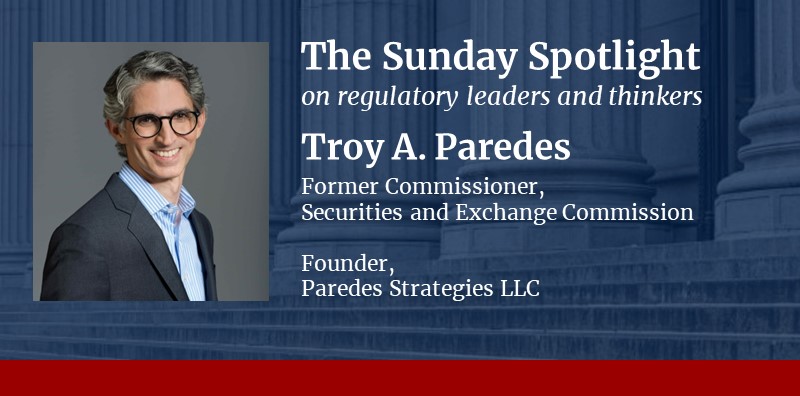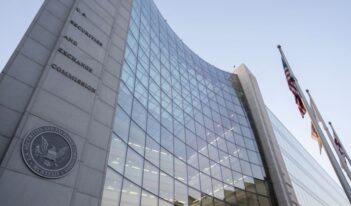
Troy A. Paredes, former SEC Commissioner, shares his thoughts on the ESG movement.
In a recent conversation with The Regulatory Review, former Commissioner of the U.S. Securities and Exchange Commission (SEC) Troy A. Paredes offers his thoughts on the growing environmental, social, and governance (ESG) movement in corporate America. He shares his views on the meaning and consequences of ESG, the developing divisiveness over ESG, and what is referred to as “greenwashing.”
Before joining the SEC, Paredes was a law professor at Washington University in St. Louis School of Law. In 2008, he was appointed to the SEC by President George W. Bush. Serving as an SEC Commissioner for five years, Paredes helped the Commission navigate the Great Recession of 2008 and oversee the implementation of the landmark Dodd-Frank Wall Street Reform and Consumer Protection Act.
After leaving the SEC in 2013, Paredes founded his own consulting practice, Paredes Strategies LLC, where he advises clients on regulatory compliance and strategy, corporate governance, and risk management. He also has served as a Distinguished Scholar in Residence at NYU School of Law and a Distinguished Policy Fellow and Lecturer at the University of Pennsylvania Law School.
The Regulatory Review is pleased to share the following interview with former SEC Commissioner Paredes.
TRR: What is ESG investing?
Paredes: The answer isn’t so easy because not everyone agrees on how to define ESG, let alone how to measure it. Setting that aside, the range of factors that investors and companies consider—and how those factors are evaluated—has changed. For example, regulators and the marketplace focus more on climate today. This focus has affected how capital is allocated and how businesses are run. I expect this trend to persist. And, going forward, different considerations will probably become more front and center, such as biodiversity. Whatever its exact contours, ESG is not a static concept.
TRR: The SEC recently issued a rule mandating that certain funds report more information about their proxy votes on ESG matters. The rule also requires these funds to make this information more accessible to investors by categorizing votes in groups such as “corporate governance” or “environment or climate.” Do you believe this type of regulation will affect how companies focus on ESG?
Paredes: These rule changes underscore the emphasis on ESG in finance and corporate governance. To me, though, it’s notable that items that today are characterized as ESG have long been part of the discussion, well before ESG was part of the vernacular. Businesses have always had numerous stakeholders.
A staple of teaching corporate law is to cover the fiduciary duties of directors and officers and the business judgment rule. Although there are nuances, a central takeaway is that boards and management have substantial discretion in shaping corporate strategy and implementing it. This involves room to consider an array of interests in determining how best to operate the business. A company that does not take care of and invest in its employees, prioritize compliance, think innovatively about emerging risks and opportunities, and contribute to its communities—all while focusing on the business’s financial performance and competitiveness—may not achieve its desired results.
TRR: How important of a problem is ESG fraud—sometimes called greenwashing—for regulators such as the SEC?
Paredes: Disclosure is the centerpiece of securities regulation in the United States. Although there is often genuine disagreement over how to regulate capital markets, there is big-picture consensus that investors need good information to make good decisions. This foundational predicate has guided the SEC and the construction of the U.S. securities law regime for 90 years. Part and parcel of this is not only ensuring that investors have important information—as reflected in the concept of “materiality”—but also that the information is accurate and not misleading. Not surprisingly, then, the mandatory disclosure requirements that the SEC imposes are buttressed by a range of anti-fraud provisions. Consequently, greenwashing has received the attention it has.
TRR: How might the approach to ESG be different if the responsibility were left to private industry as compared to the SEC looking to regulate and ratchet up oversight in this area?
Paredes: I worry that the term ESG has become divisive, often stirring spirited statements “for” or “against” it. On the other hand, there’s considerable common ground that businesses should be run to achieve long-term success. A viable, thriving company—today and in the future—requires considering a broad array of factors in addition to the immediate “here-and-now” earnings impact. Time horizons matter.
Without question, boards and management teams regularly need to make difficult decisions about strategy, operations, and risk management, and there can be competing considerations. A focus on profitably producing goods and services that consumers want, treating employees well and with respect, complying with regulatory requirements, investing in continuous improvement and growth, and giving back to the community should work to propel a company’s overall performance and value over time. With that said, whether and how the SEC should regulate in the ESG space, and limitations on its authority to do so, are separate questions.
TRR: What trends in the SEC’s enforcement of ESG matters have you witnessed during and since your time as an SEC Commissioner?
Paredes: I have not seen a significant increase in SEC enforcement actions involving ESG; nor have I seen a significant increase in private litigation. The SEC has indicated that this is a focus, so more cases might arise, particularly after the SEC finalizes its climate rule and anticipated human capital management rule requiring companies to make additional disclosures in these areas. Without delving into details, well-developed case law applying “materiality”—an element required to establish fraud under the federal securities laws—could create hurdles for any enforcement action or class action concerning ESG-related disclosures depending on their nature and generality.
TRR: Beyond ESG investments and disclosure issues, what do you see as the most important regulatory issues facing corporate governance and securities law in the coming years?
Paredes: First, the volume, pace, and magnitude of regulatory change will be difficult to manage. It will require extensive development and implementation of policies and procedures, systems, controls, processes, training, oversight, governance, and the like.
Second, emerging technology springs to mind. I am particularly fascinated by how decision-making is evolving. More information is available to us than ever before, and we have more technology, such as artificial intelligence, to assist us in accessing, digesting, and using this information. This combination of data and technology offers a profound one-two punch that changes how decisions are made. I can’t address all aspects of this here, but I do want to acknowledge that it impacts businesses, investors, and regulators. The hope, of course, is that people’s lives will improve as technology expands our capabilities.
The Sunday Spotlight is a recurring feature of The Regulatory Review that periodically shares conversations with leaders and thinkers in the field of regulation and, in doing so, shines a light on important regulatory topics and ideas.



